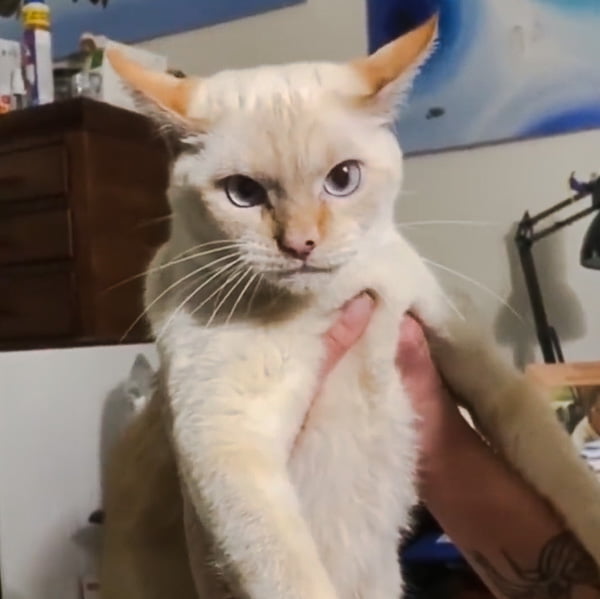Overview: Cat behavior explained? I asked regular and valued visitors to this site to write about “cat behavior”. Their mini-essays are published below. Unprompted, they wrote about human behavior. This is correct. You cannot ignore the most significant factor with regards to cat behavior, which is our expectations, the environment that we create for ourselves and our cat, and how we interact with them. Cats are very sensitive to their environment. Their behavior reflects their environment. We create the environment.
Note: this was first published in around 2010! I cleaned it up a little and republished it as I think it needs to be read.

The authors are highly qualified on the subject of cat behavior but their voice is yet to be formally heard. The name of the person heads the text.
There are many such people. You don’t have to be a cat behavior expert who is widely published to explain cat behavior. You need to rely on common sense and have a deep respect for the cat born out of a general respect for all creatures.
 Our cat is a domesticated African wild cat. It happened 10,000 years ago but if we reference back to wild cat behavior we will understand domestic cat behavior. Fundamentally, the domestic cat is a cat’s whisker away from the wild cat.
Our cat is a domesticated African wild cat. It happened 10,000 years ago but if we reference back to wild cat behavior we will understand domestic cat behavior. Fundamentally, the domestic cat is a cat’s whisker away from the wild cat.
If you would like to read an in-depth article about all aspects of cat behavior, this page might help.

To: Cat Breeds A-Z – Wild Cats – Cat History – Cat Sounds
Grahame – Au contraire, it is human behavioural problems…
“It’s really too bad that we cannot get articles from the cats themselves on the topic of human behavioural problems as experienced by domestic cat companion animals.
You know by now that my take on these things, on long experience with many cat companions, is that human behaviour influences the cat behaviour and sets the tone. In over 65 years of living with cats, I have yet to experience what might be called a feline behavioural problem.”
Valley Girl – Important point about correct expectations
~For example, I think that correct expectations from us are important as people with the correct expectations do not see normal cat behavior as problem behavior which is how it is sometimes described.~
Clawing of furniture would be one example– especially for an indoor cat. One of the ways that cats remove the older layers of claws is to claw on things. All of my collection of shed cat claws comes from Tootsie’s cat claw towers, or nearby.
A cat’s gotta do what a cat’s gotta do. Like take care of their claws.
A very few times Tootsie tried clawing furniture, or the bed springs. I’d just remove her, and say “no, you don’t want to do that”, and take her to the cat tower, where she got ample reinforcement for clawing. Oh, good kitty! What a good girl! etc.
No more attempts to claw furniture.
The cat tower (surrounded with carpet) worked because it suited Tootsie. Other cats seem to like corrugated cardboard claw pads. Or sisal rope. So, it’s also a matter of figuring out what suits the cat.
Barbara – My contribution
From the moment you decide to take a kitten or cat into your family the way you think must change. Even deciding if you should choose a kitten or a grown cat is huge, for example do you have the time and patience to care for a kitten who doesn’t sleep the appx 16 hrs a day that adult cats do?
Kittens have bursts of energy and play quite violently and then fall asleep instantly only to awake shortly after and do it all over again, and this is day and night, so if you think that maybe you couldn’t cope with behavior that compares with the terrible two’s in human babies then you should consider adopting an older cat past this stage.
Another important issue to think about is do you have the patience to teach your cat right from wrong in a gentle and tolerant way? By this I mean that although cats are extremely intelligent they may not readily accept your house rules, so if you decide for example that there will be no scratching of furniture and your cat decides that in fact the sofa is ideal for the purpose of stretching muscles in the paws, legs and back and shedding claw shards have you the patience to repeatedly show your cat where he should be performing these exercises without resorting to surgically amputating his toe ends as a short cut to training?
Having made your decision and brought into the family your new feline member you now have to forever “think cat” and that is to look at every aspect of your home and decide if it is cat safe. This includes open windows; can they be guarded in some way so that your cat cannot accidentally fall out while trying to catch a housefly or a bird outside the window. Are wires to electrical appliances safely tucked away from tiny paws and mouths that know nothing of electrical shocks? Can you train yourself and your family not to step backwards without checking for a furry figure sitting behind you? Do you know which house and garden plants are safe and which are poisonous to cats?
This knowledge could mean life or death to your cat.You should also decide if your cat will be a member of the family with full rights to enjoy home comforts. Will he be allowed access to the lounge and bedroom? Some people think allowing cats onto beds is unclean, my opinion is I am honoured when my cat chooses to crawl into bed and into my arms, such moments are beautiful and show perfectly how much trust he has in me to allow me to hold him in the vulnerability of his sleep.
I guess the true cat lover realises that most of the adapting will be done by the humans, we are the ones that choose to adopt the cat, we know that cats are animals with instincts for different behavior to us, we know that cats have claws and teeth, we know they need regular grooming, play, a bed, access to clean water, litter, quality food and veterinary attention, in fact in the UK our Animal Welfare law quite rightly demands this so in the end the most important thing to consider is can you provide the cat with everything he needs, wants and deserves?
Ruth – aka Kattaddorra
The key to understanding a cat is to realise that what is bad behavior in a human is not the same in a cat. A new cat caretaker may have different expectations about a kitten. Encouraging him to play rough by rolling him over and tickling his tummy may be amusing but it gives the wrong message to the kitten. When he grows up he will be confused as to why it is wrong to bite and kick his human family’s hands and feet.
Stop a kitten from biting inappropriately by silently distracting him. Have cat toys handy and put one gently by his mouth or throw it for him to chase. When he grabs the toy, praise him saying his name. He soon learns that bad behavior brings silence, good behavior brings praise. To stop him scratching a person or the furniture, follow the same rule. Silently lift him to his scratching post and praise him saying his name when he uses it. It’s easy to show a kitten how to do that by dragging your own nails down while he watches, then gently guide his front legs up the post until he digs in his claws.
Scratching is not bad behavior in a cat, it is necessary behavior. He will soon learn that using his own furniture brings him praise. Cats need consistency and routine. Gently lifting him down from places he won’t be allowed when he is bigger teaches him if he goes there he will be removed. Punishment is unkind and pointless. The cat only becomes nervous of the person punishing him. They learn by kindness and patience. A mother cat keeps her kittens under control by carrying them by the scruff of their necks but a human should never pick up a kitten or a cat by the scruff unless in an emergency and there is no other way to handle him. A cat’s whole body needs support on being picked up. Reach down with both hands and hold him with one while making a seat with the other, always slowly and gently.
Cats should never be lifted by their front legs, the whole weight of their body on those legs can cause dislocation of the joints. Although cats have been domesticated for thousands of years now, they still have their wild instincts deep inside and a threatened or frightened cat will naturally lash out.
It’s wrong to praise a cat if he catches a mouse, yet to show displeasure if he catches a bird. He doesn’t know that although most people dislike mice, they admire birds. Even well-fed cats have the hunting instinct. It’s Nature’s way of ensuring the survival of the fittest. A cat needs food and water in a regular place, a warm bed and the love and understanding of his human family. He likes attention and fun and games but he also likes to sleep in peace and should be allowed to do so.
Children need to learn to handle a kitten gently and to respect when he wants to sleep that they should leave him alone. A cat needs privacy for his toileting needs, his litter tray should be placed in a quiet corner and nowhere near the place he is normally fed. Cats hate to be laughed at but they love it if you laugh with them and soon learn how to create a happy atmosphere in the home.

